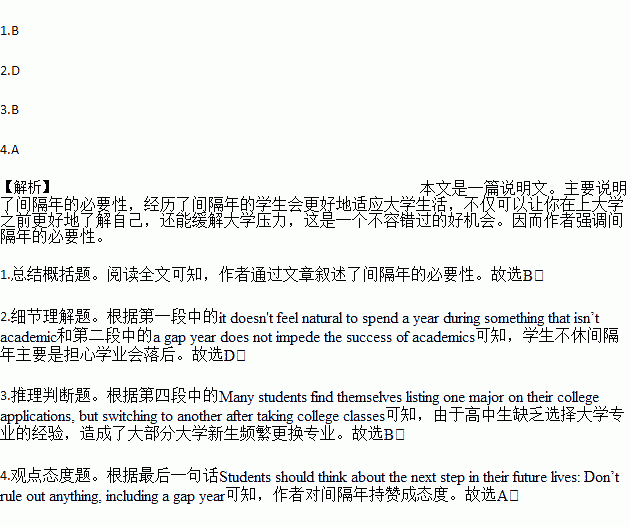题目内容
Today, widespread social pressure to immediately go to college together with increasingly high expectations in a fast -moving world often causes students to completely overlook the possibility of taking a gap year. And after going to school for 12 years, it doesn't feel natural to spend a year during something that isn’t academic.
But despite common misconceptions, a gap year does not impede the success of academics—in fact, it probably promotes it.
Studies show that students who take a gap year are generally better prepared for and perform better in college than those who do not. Gap year experiences can lessen the difficulty when it comes to adjusting to college and being thrown into a brand new environment, making it easier to focus on academics and activities.
Nearly 80 percent of college students end up changing their majors at least once. Many students find themselves listing one major on their college applications, but switching to another after taking college classes. At Boston College, for example, you would have to complete an extra year were you to switch to the nursing school from another department. Taking a gap year to figure things out initially can help prevent stress and save money later on.
Many people, however, argue that the gap year itself can take much money. That’s a math. There are formal gap year programs that are rather pricey, but there are also many opportunities to volunteer and receive free housing or even get paid for your gap year.
Perhaps the most convincing reason for taking a gap year is that it offers a unique opportunity that will likely never reappear. After graduating from college, it's possible to take some time off. Students should think about the next step in their future lives: Don’t rule out anything, including a gap year.
1.What might be the author's purpose by writing the passage?
A. To explain what the gap year really is.
B. To prove the necessity of the gap year.
C. To introduce the way to take the gap year.
D. To describe the students taking their gap year.
2.What stops students taking their gap year?
A. The pricey gap year programs.
B. Bad performance in high school.
C. High expectations for college life.
D. Worrying about falling behind in study.
3.What can we know about students from the passage?
A. Nearly 80 percent of college students change their majors only once.
B. High school students have little experience to choose college majors.
C. many new comers of college are suffering from acclimation blunders.
D. All colleges allow their students to change their majors free of charge.
4.What is the author’s attitude towards the gap year?
A. Favorable. B. Critical.
C. Concerned. D. Indifferent.
 天天向上一本好卷系列答案
天天向上一本好卷系列答案 小学生10分钟应用题系列答案
小学生10分钟应用题系列答案
